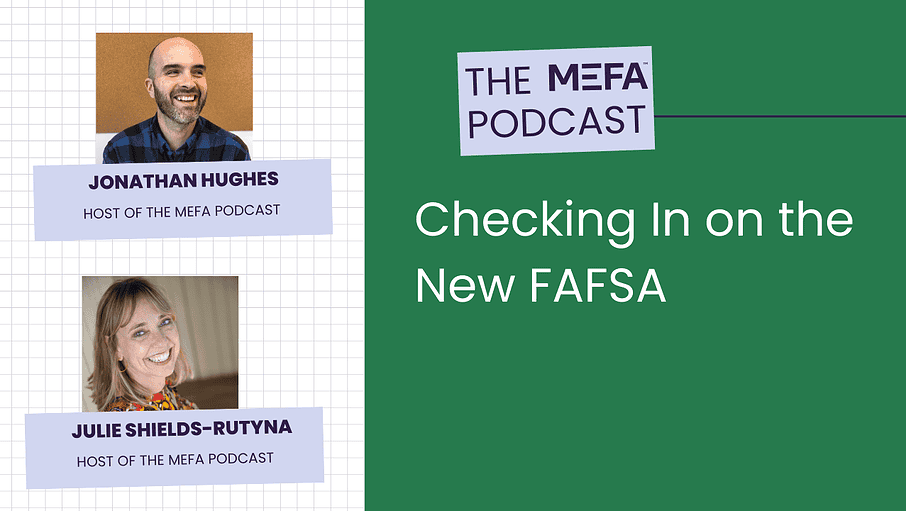

Resources Mentioned in this Episode
Jonathan Hughes: [00:00:00] Hello everyone and welcome to the MEFA Podcast. My name is Jonathan Hughes. And I’m Julie Shields-Rutyna. Happy New Year, Julie!
Julie Shields-Rutyna: Happy New Year!
Jonathan Hughes: This is like an emergency podcast. The FAFSA’s out, right? We knew it was coming out New Year’s Eve, December 31st so now the FAFSA’s out and it’s smooth sailing from here, right? The Washington Post has a headline “The FAFSA is Off to a Rocky Start” Forbes says “Unable to Complete a 2024-2025 FAFSA? You Are Not Alone.” and so we’ve heard this if there are problems with the FAFSA, Julie, what’s going on with the FAFSA?
Julie Shields-Rutyna: Oh, I know. The FAFSA launched on New Year’s Eve as they told us it would. And as you mentioned and they called it a soft [00:01:00] launch, meaning that there were going to be limited hours where the application was available. Now, this is why it’s so challenging. We’ve had an almost three-month delay for the FAFSA. And so that’s three months. of families waiting to begin their FAFSA. Many of them thinking New Year’s Eve, New Year’s Eve is now when I’ll do it. And as you can imagine, we’ve been hearing from parents who are now having a hard time getting into the FAFSA and completing it. And even sometimes when they get in there, they get booted out. So there are many families who are not enjoying this experience and feeling in a little bit of a panic because they’ve been waiting and waiting. And now this FAFSA launch isn’t as clean and simple as as they want it to be, of course.
Jonathan Hughes: Yeah okay. So assuming as you should, that this podcast is for those families who are eager to file that haven’t been able [00:02:00] to do it or are unsure whether or not they should start filing the FAFSA because they’ve heard that there’s problems. What would we say to those families?
Julie Shields-Rutyna: Yes. The overall message is just don’t panic. There is plenty of time to file the FAFSA. But some people are getting through and being able to file the FAFSA. So the FAFSA is being processed for some people every day, even with some connectivity and limited availability. You can. But what I would say is, go, log in, try to file the FAFSA. And of course, save as you go along. But, if you get booted out, or if something happens, instead of panicking, which, understandably, that’s the reaction that I would have too, probably, just know many people are getting booted out.
There are problems with it, and that’s why the Department of Education and Federal Student Aid is shutting it down for certain periods [00:03:00] because they’re watching and seeing how it’s going and they’re trying to fix things on the go. So just don’t worry about it. And then maybe. Try again two days later so don’t panic. Please just try it and then wait a couple of days and just know you’re one of thousands of people who are in this situation.
Jonathan Hughes: Yeah, and so I think too if we could talk about the back end of this process that a lot of families are not aware of, obviously, right? Can we talk about that and why this gives them a couple extra weeks perhaps to file when they might think they have?
Julie Shields-Rutyna: Yes. The family goes in and completes their FAFSA online, all of the information about, their family and income from the IRS asset information. And then. It gets that data gets sent to the colleges that they’re applying to once they submit it. But it goes first through the federal processing center [00:04:00] and that’s the difference here.
So the federal processing center sends it to the colleges and it’s not going to be sending that information until the end of January anyway. So no one is behind. If you complete your FAFSA in January, then your information will be sent to the colleges by the end of January, and you’re not behind at all in this process.
Jonathan Hughes: So even if you filed your FAFSA on New Year’s Eve, the college won’t actually get that information from your FAFSA until the end of January. Is that right?
Julie Shields-Rutyna: Yes, it is. That’s exactly right. And so I know that families have felt like they’ve waited so long and they’re, they want to get this completed and that’s a good thing. You should keep that momentum, keep that excitement about making sure you file this form. But if something happens and you get booted out or there’s an issue, don’t worry about it. Just go back in a few days later, maybe try it a different time of day or something like this.
Jonathan Hughes: I think we should maybe back up and talk about timing in [00:05:00] general and about deadlines, because it can be confusing, right? Because there might be different deadlines that families have to contend with. So if you go to studentaid.gov to complete a FAFSA, Let’s say you try to get in, you’re not able to get in, so you start to worry about what’s the deadline for the FAFSA? You look on the website for the deadline, and you might see this language on studentaid.gov, which is you can complete the form to apply for financial aid to help pay for attendance at college between July 1st, 2024 and June 30th, 2025. You will have plenty of time to complete the FAFSA form. This can cause some families to think that they should wait maybe until July 1st to complete the FAFSA. That’s not the case. Julie, what does that refer to?
Julie Shields-Rutyna: Yes. So when students complete the FAFSA to apply for financial aid, they’re applying for aid from the federal government, the state government, and the colleges themselves. So the FAFSA is for all [00:06:00] of those. And since the academic year runs from July 1st through June 30th, that language refers to the fact that if you’re a student in a given academic year, you can still apply for financial aid during the year, even that you’re a student and maybe, get a federal direct student loan, if that’s what you’d like, or a Pell Grant, if you’re eligible for that. So it’s possible that some aid is still available even up until the whole time that FAFSA is open.
But colleges have deadlines and priority deadlines to apply for financial aid. Especially for their own institutional aid. And just be sure to apply by the college’s deadline. And that’s why you don’t want to wait on this. You do want to get this form done as soon as possible. But it just doesn’t have to be done tomorrow or next week.
It just has to be done in the next few weeks. And you will see, I’m [00:07:00] sure, that college deadlines will be appropriate, for that. Every college knows what’s going on here. And so you do want to get this done as soon as possible. But, all these families are having some issues. Just get it done over the next few weeks.
Jonathan Hughes: Yeah. So what about this message that families get sometimes that they need to apply for financial aid early?
Julie Shields-Rutyna: Yeah, if a college has a financial aid deadline, then anyone who applies by that deadline is putting themselves, in the way of being eligible for what they’re eligible for. If the college has a deadline of February 15th and you apply for the FAFSA on February 1st versus February 10th, it doesn’t matter. Both families have applied by February 15th, which is the deadline, and both students are going to be eligible for the financial aid that is being awarded.
Jonathan Hughes: And just again to reiterate something that you said and something that I haven’t said in about 10 minutes [00:08:00] is that colleges are aware of everything that’s going on they’re not just in a silo here and just waiting for faxes, right? So If parents have questions or if they see a deadline, that’s January 15th or, a really early deadline and they’re concerned about meeting that what should they do?
Julie Shields-Rutyna: Yes, contact the financial aid office at the institution and talk it through with them.
Jonathan Hughes: Okay. So to summarize so far, so we have number one, you might still be able to file a FAFSA, right? So thousands of people, hundreds of thousands, perhaps. Tens of thousands, maybe, have. If you’re having a hard time connecting, number two, don’t get too stressed, there is still time. Because, there’ll be a few weeks before colleges even get that information. Number three, keep on top of college deadlines, right? So be mindful of a college FAFSA deadline, and make sure you submit before then. So those are three pieces of advice. Is there a fourth?
Julie Shields-Rutyna: [00:09:00] Just I guess it is to stay in touch with the colleges or check on the college websites where you’re applying because colleges are paying attention to this and may adjust deadlines accordingly if needed at this point. They probably don’t need to they’re waiting to see when all of this is going to be ironed out But if this goes on a little longer, they may adjust their deadlines so stay on top of the financial aid deadlines at the various colleges, and I’ll also say to keep connected with federal student aid.
Jonathan Hughes: So they’ve announced some updates over their social media channels, and so you know, they like they I know, for instance, they posted that the FAFSA is going to be available 8 a.m. to 8 p.m. on certain days or that the data exchange tool is not going to be available Saturday morning, this upcoming Saturday morning when we’re recording this, which would be the, what’s the date this Saturday? Regardless, [00:10:00] so you know, things like that to know ahead of time before you start because if you’re going to be doing the FAFSA, you’re not going to be able to do it a lot of times without that data exchanged in the IRS. So maybe if you’re planning on doing it Saturday, January 6th from 6 a. m. to noon, maybe plan for 1 p. m. instead. So that’s the kind of information that, that they’re giving out that I think, and we can put links to the social media channels and the websites that are going to give you that information in the show notes. So should we do a mailbag question?
Julie Shields-Rutyna: Sure.
Jonathan Hughes: Okay, let’s do a mailbag question So these are questions that have come in to us over the past two weeks and answered by our college planning team. So remember if you have any questions related to planning, saving, and paying for college. You can reach out to us over email at [email protected], or you can call us at 800-449-MEFA and you can reach us over social media too on Facebook that’s @ and on Instagram that’s [00:11:00] @MEFA_MA and I’m actually I’m not going to do an email or anything like that I came into this week thinking that we were going to just have wall to wall FAFSA questions. People filing their FAFSAs. I was a little surprised that we didn’t seem to have that the first day or two, and now I know why that is, because a lot of families are having trouble getting in.
But, what I have been getting are some FSAID questions. And I thought this is a simple question, but I think it touches on some different aspects. The question I’ve got, surprisingly, a few times is, does it matter which parent creates the FSA ID? Maybe you could just explain the background on this question, and which parents need an FSA ID in which cases and does it matter in the cases where only one parent needs an FSA ID, which one it is?
Julie Shields-Rutyna: No, that’s great. Yeah, so I will back up a little bit because now with the new FAFSA, every parent whose information is [00:12:00] on the FAFSA form needs an FSA ID and needs to consent that their information can be brought over from the IRS with one very big exception, and that is the exception of parents who are married and filed their taxes jointly. So that’s a lot of people and anyone in that stage just needs the one parent FSA ID and It does not matter which one. I guess I would say it’s the one who enjoys completing federal forms online more than the other. Which now that I think about it there probably is decidedly one of the people in it.
Jonathan Hughes: So thanks, Julie. One more time. If you have questions on financial aid or anything related to planning, saving and paying for college, reach out to us. We have a bench of college guidance. experts for you to talk to. I’ll give you the information again. Email is [00:13:00] collegeplanningatmefa.org, phone number 800 449 MEFA, Facebook @MEFAMa, X @MEFATweets and Instagram @MEFA_MA. Julie, I think that wraps it up for our emergency FAFSA pod. Do we have any other sort of links to share or anything? Oh, should we talk about the FAFSA festival that we’re having?
Julie Shields-Rutyna: Oh, yes, that’s great. Yeah, we’re going to have an online FAFSA festival where families can join us during a two-hour window, and it’s going to be on January 24th, 4 to 6. And we will have FAFSA experts there to help you and we will, you’ll join the zoom meeting and we’ll put you in a breakout room with a FAFSA expert to answer any FAFSA questions or help you complete the form or whatever you need at that stage. I would encourage you to join, to get help if you need it, and that will be a [00:14:00] really great day. And we’ll hope to have some of these FAFSA issues behind us at that point.
Jonathan Hughes: Yeah, and you can register for that on mefa.Org. Julie, thank you very much.
Julie Shields-Rutyna: Thanks, Jon.
Jonathan Hughes: I also want to thank Shaun Connolly, our producer, AJ Yee, and Lauren Danz for their assistance in hosting the show. Once again, my name is Jonathan Hughes, and this has been the MEFA Podcast. Thanks.









